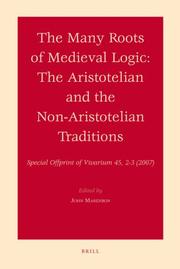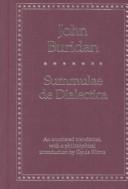| Listing 1 - 10 of 3429 | << page >> |
Sort by
|

ISBN: 1281937290 9786611937294 9047422945 9789047422945 9781281937292 9789004164871 9004164871 Year: 2007 Publisher: Leiden Boston Brill
Abstract | Keywords | Export | Availability | Bookmark
 Loading...
Loading...Choose an application
- Reference Manager
- EndNote
- RefWorks (Direct export to RefWorks)
Medieval logic is usually divided into the branches that derived from Aristotle's organon - the 'logica vetus' and 'logica nova', and those invented in the Middle Ages, the 'logica modernorum'. In this volume, a group of distinguished specialists asks whether the ancient roots of medieval logic were not in fact more varied. Stoic logic was mostly lost, but were some of its themes transmitted, even in distorted form, through Boethius and through the grammatical tradition? And did other schools, such as the sceptics and the Platonists, contribute in their own ways to medieval logic?
Book
ISBN: 3110808226 9783110808223 Year: 2015 Publisher: Berlin Boston
Abstract | Keywords | Export | Availability | Bookmark
 Loading...
Loading...Choose an application
- Reference Manager
- EndNote
- RefWorks (Direct export to RefWorks)
Book
ISBN: 9654065894 9789654065894 Year: 2012 Publisher: Jerusalem
Abstract | Keywords | Export | Availability | Bookmark
 Loading...
Loading...Choose an application
- Reference Manager
- EndNote
- RefWorks (Direct export to RefWorks)
Book
ISBN: 3030796795 3030796787 Year: 2021 Publisher: Cham, Switzerland : Springer,
Abstract | Keywords | Export | Availability | Bookmark
 Loading...
Loading...Choose an application
- Reference Manager
- EndNote
- RefWorks (Direct export to RefWorks)
Book
ISBN: 019163798X 9780191637988 9780191765339 0191765333 9780199661848 0199661847 9780199661855 0199661855 Year: 2013 Publisher: Oxford
Abstract | Keywords | Export | Availability | Bookmark
 Loading...
Loading...Choose an application
- Reference Manager
- EndNote
- RefWorks (Direct export to RefWorks)
'Oxford Studies in Medieval Philosophy' showcases the best new scholarly work on philosophy from the end of antiquity into the Renaissance. It combines historical scholarship with philosophical acuteness, and will be an essential resource for anyone working in the area.
Book
ISBN: 940241665X Year: 2020 Publisher: Dordrecht : Springer Netherlands : Imprint: Springer,
Abstract | Keywords | Export | Availability | Bookmark
 Loading...
Loading...Choose an application
- Reference Manager
- EndNote
- RefWorks (Direct export to RefWorks)
The second edition of the Encyclopedia of Medieval Philosophy is expanded and substantially revised. It is the largest reference work of medieval philosophy in English and it covers all the four language traditions, Latin, Arabic, Greek, and Hebrew, of western medieval philosophy. The Encyclopedia covers all areas of philosophy in the Middle Ages and part of the Renaissance, ranging from 500 to 1500 CE. It contains general entries on medieval philosophers and medieval philosophies and on the key terms and concepts in the subject area, but it also provides more in-depth details and analyses of particular theories. Furthermore, in order to gain an insight into the social and cultural context of the material, entries are included on the teaching of philosophy, the career of philosophers, and the place of philosophy within the universities. Complete with cross-references between key words and related essays to enable efficient searches, this Encyclopedia is exhaustive, unprecedented, and user-friendly. It is indispensable for scholars of medieval philosophy and Medieval Studies, and it is also useful for anyone interested in medieval ideas and thought.
Book
ISBN: 1282950754 9786612950759 9047441133 9789047441137 9789004178786 9004178783 Year: 2009 Publisher: Leiden Boston Brill
Abstract | Keywords | Export | Availability | Bookmark
 Loading...
Loading...Choose an application
- Reference Manager
- EndNote
- RefWorks (Direct export to RefWorks)
The studies in this volume present early science in its rich and divergent complexity. Many historians of the Scientific Revolution have used early modern scholasticism to represent pre-seventeenth century science as a whole, but a close look at ancient, medieval, and even early modern scientific writers shows that before the Scientific Revolution - and not only in Europe - there were many and diverse traditions of interpreting the natural world. This book provides a broad range of historical evidence concerning early science, which may be used as a basis for new and more complex historical interpretations. Originally published as Volume XIV, Nos. 1-3 (2009) of Brill's journal Early Science and Medicine .
Periodical
Year: 2015 Publisher: Verona, Italy : Edizioni Fiorini,
Abstract | Keywords | Export | Availability | Bookmark
 Loading...
Loading...Choose an application
- Reference Manager
- EndNote
- RefWorks (Direct export to RefWorks)
Book
Year: 1995 Publisher: Paris, France : Éditions de la Sorbonne,
Abstract | Keywords | Export | Availability | Bookmark
 Loading...
Loading...Choose an application
- Reference Manager
- EndNote
- RefWorks (Direct export to RefWorks)
Connue de longue date pour ses visions, l'abbesse allemande Hildegarde de Bingen (1098-1179) a conquis ces dernières années un public de plus en plus large grâce à deux autres de ses dons. Cette bénédictine géniale, dont la longue vie fut particulièrement active, s'essaya en effet avec autant de succès à la musique et à la médecine, domaines dans lesquels peu de femmes ont laissé leur nom. Ses chants liturgiques (dont elle composa elle-même le texte et la musique) ont été conservés dans des manuscrits contemporains de leur auteur, et sont abondamment joués et enregistrés. Sa science naturelle en revanche, si elle séduit un nombre toujours croissant d'adeptes en quête d'alternatives à la médecine traditionnelle, ne présente pas les mêmes garanties de fiabilité : les préceptes médicaux de Hildegarde, que le public redécouvre aujourd'hui avec enthousiasme, nous ont été transmis par des manuscrits tardifs, et donc susceptibles d'avoir subi bon nombre de modifications. Les écrits scientifiques qu'elle conçut et rédigea se confondent-ils réellement avec ceux qui nous sont parvenus ? L'édition qu'on en donna à la Renaissance à Strasbourg fut-elle établie d'après un manuscrit aujourd'hui disparu, ou est-elle une belle infidèle ? Et si l'étonnant savoir naturaliste de Hildegarde est bien le sien, d'où cette moniale prétendûment inculte tenait-elle ces connaissances ? Autant de questions que l'auteur a tenté de résoudre en prenant ces traités médicaux en filature à travers les siècles : les résultats de l'enquête forment le récit des aventures et des avatars d'un oiseau rare, une œuvre scientifique composée par une femme hors du com¬mun dans l'Occident du XIIe siècle.

ISBN: 1281731161 9786611731168 0300132867 9780300132861 9780300084252 0300084250 Year: 2001 Publisher: New Haven
Abstract | Keywords | Export | Availability | Bookmark
 Loading...
Loading...Choose an application
- Reference Manager
- EndNote
- RefWorks (Direct export to RefWorks)
This volume is the first annotated translation in any language of the entire text of the Summulae de dialectica, by the Parisian master of arts John Buridan (1300-1358). One of the most influential works in the history of late medieval philosophy, the Summulae is Buridan's systematic exposition of his nominalist philosophy of logic. Buridan's doctrine spread rapidly and for some two hundred years was dominant at many European universities. His work is of increasing interest today not only to historians of medieval philosophy but also to modern philosophers, several of whom find in Buridan's ideas important clues to problems of contemporary philosophy. Gyula Klima provides a substantial introduction to Buridan's life and work and discusses his place in the history of logic. Through extensive notes Klima assists philosopher and medievalist alike to read Buridan with understanding and insight. Those with a philosophical interest in the relations among the structures of language, thought, and reality will find much to ponder in the Summulae.
| Listing 1 - 10 of 3429 | << page >> |
Sort by
|

 Search
Search Feedback
Feedback About UniCat
About UniCat  Help
Help News
News